Meet the Essay Contest Winners
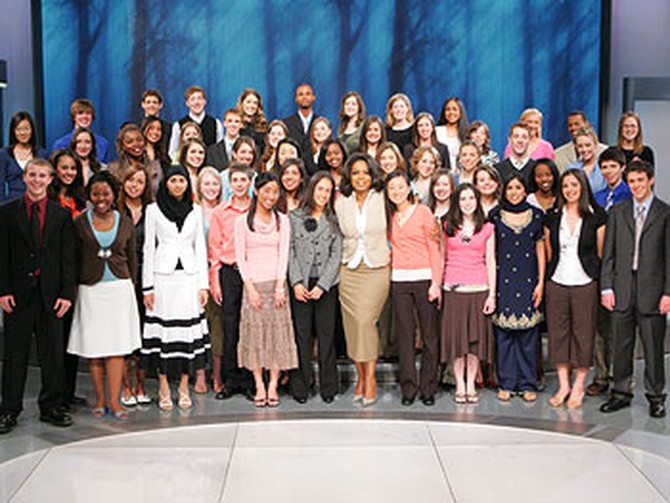
50,000 Entries and Only 50 Winners
As soon as the first ever Oprah's National High School Essay Contest was announced in January 2006, the entries began pouring in. Fifty thousand students responded to the question, "Why is Elie Wiesel's book Night relevant today?"
A special team of teachers and librarians were hired to join Harpo staffers in narrowing down the selection to 100 semi-finalists. Then a panel of esteemed judges chose the final 50 winners, who hail from 22 states and speak 13 languages. Three are class presidents and all are honor students. Three have relatives who survived the Holocaust—and some have even survived genocide themselves. Each winner is eloquent and passionate.
A special team of teachers and librarians were hired to join Harpo staffers in narrowing down the selection to 100 semi-finalists. Then a panel of esteemed judges chose the final 50 winners, who hail from 22 states and speak 13 languages. Three are class presidents and all are honor students. Three have relatives who survived the Holocaust—and some have even survived genocide themselves. Each winner is eloquent and passionate.
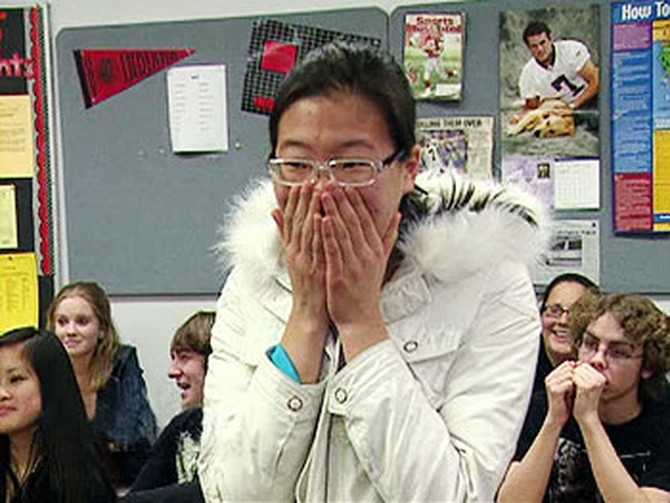
It was a happy day as teachers and principals got in on the surprise and announced the good news to the winners.
The students are thrilled to learn that they'll be flown to The Oprah Winfrey Show to meet Professor Wiesel. Next stop, Chicago!
The students are thrilled to learn that they'll be flown to The Oprah Winfrey Show to meet Professor Wiesel. Next stop, Chicago!
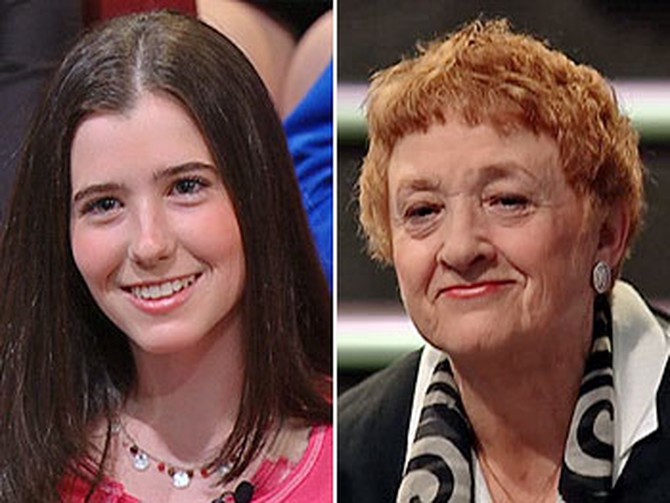
For 17-year-old essay winner Jessica Blank, keeping the memory of the Holocaust alive is something she takes very seriously. Her friend and mentor, Hedy Brasch, whom she met through the program Adopt-a-Survivor, was just 14 years old when she was deported with her mother and sister to Auschwitz. Though Jessie and Hedy grew up years and worlds apart, they are deeply connected by a solemn vow. When Jessie is 56 years old, on the 100th anniversary of the liberation of Auschwitz, she has promised to retell Hedy's story of survival. "I have made this promise because I want Mrs. Brasch's story to live forever," she says.
"Many of the survivors, they feel that they are going to be forgotten and maybe just a heap in the ashes of history," Hedy says. "Whenever people are discriminated against, [Jessie] will take a stand."
The Adopt-a-Survivor program is locally operated and based in New York. If you are interested in more information, contact Irving Roth, Director of the Holocaust Resource Center at Temple Judea of Manhasset, by e-mail: irving.roth1@verizon.net.
"Many of the survivors, they feel that they are going to be forgotten and maybe just a heap in the ashes of history," Hedy says. "Whenever people are discriminated against, [Jessie] will take a stand."
The Adopt-a-Survivor program is locally operated and based in New York. If you are interested in more information, contact Irving Roth, Director of the Holocaust Resource Center at Temple Judea of Manhasset, by e-mail: irving.roth1@verizon.net.
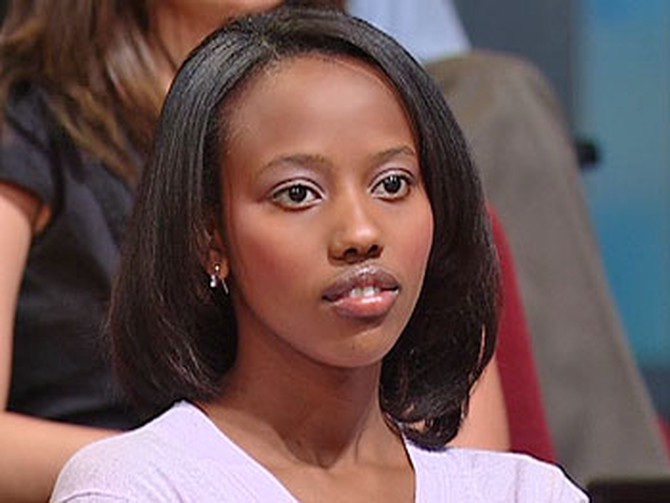
Many students wrote heartfelt essays about modern-day genocide. Two contest winners actually lived it.
For Belise Rutagengwa, Night is a chilling reflection of her own life as a child in Rwanda. In 1994, when she was only 5 years old, 800,000 people were murdered during 100 days of bloody terror. "I saw people getting slaughtered. I saw women who were pregnant getting macheted and their babies thrown out onto the trees," she says. "I didn't understand why people were being killed—and in front of my face, like little children being cut. It was just...I will never get those images out of me."
Belise's parents, grandparents and members of her extended family were killed. She now lives with her aunt in Indiana and attends a boarding school outside of Chicago. Belise says that Night has given her life a sense of purpose. "When I was reading Professor Wiesel's book ... I think [I realized] that God saved me because I was left to tell what happened, for those who are silent now—who have no voice. I think that as Professor Wiesel said, it would be inhuman of us to let the world leaders say that never again will this happen when we know today in Sudan people are getting slaughtered daily and we're doing nothing about it. ... I join with Elie Wiesel in praying that his book will inspire us to change the world one 'night' at a time."
For Belise Rutagengwa, Night is a chilling reflection of her own life as a child in Rwanda. In 1994, when she was only 5 years old, 800,000 people were murdered during 100 days of bloody terror. "I saw people getting slaughtered. I saw women who were pregnant getting macheted and their babies thrown out onto the trees," she says. "I didn't understand why people were being killed—and in front of my face, like little children being cut. It was just...I will never get those images out of me."
Belise's parents, grandparents and members of her extended family were killed. She now lives with her aunt in Indiana and attends a boarding school outside of Chicago. Belise says that Night has given her life a sense of purpose. "When I was reading Professor Wiesel's book ... I think [I realized] that God saved me because I was left to tell what happened, for those who are silent now—who have no voice. I think that as Professor Wiesel said, it would be inhuman of us to let the world leaders say that never again will this happen when we know today in Sudan people are getting slaughtered daily and we're doing nothing about it. ... I join with Elie Wiesel in praying that his book will inspire us to change the world one 'night' at a time."

Horrific memories will always haunt Clemantine Wamariya, who was just a 6-year-old child in Rwanda when she says she hid in a banana tree, listening to the screams coming from her grandparents' house as members of her family were murdered.
Clemantine and her 16-year-old sister, Claire, were left to fend for themselves. They say they hid for 100 terrifying days and then spent six years in refugee camps across Africa, always holding out hope that their parents survived and they would one day be reunited.
Clemantine and Claire moved to America in 2000. The two sisters continued to search for their parents, contacting the Red Cross, UNICEF and other organizations, but had no success. Then, one day, through a chance meeting at the home of an acquaintance, Clemantine and Claire got the news that their mother and father were both alive!
The family soon reconnected over the phone, but Clemantine and Claire haven't seen their parents in person since the genocide began 12 years ago. They even have two new siblings they've never met!
Clemantine and her 16-year-old sister, Claire, were left to fend for themselves. They say they hid for 100 terrifying days and then spent six years in refugee camps across Africa, always holding out hope that their parents survived and they would one day be reunited.
Clemantine and Claire moved to America in 2000. The two sisters continued to search for their parents, contacting the Red Cross, UNICEF and other organizations, but had no success. Then, one day, through a chance meeting at the home of an acquaintance, Clemantine and Claire got the news that their mother and father were both alive!
The family soon reconnected over the phone, but Clemantine and Claire haven't seen their parents in person since the genocide began 12 years ago. They even have two new siblings they've never met!
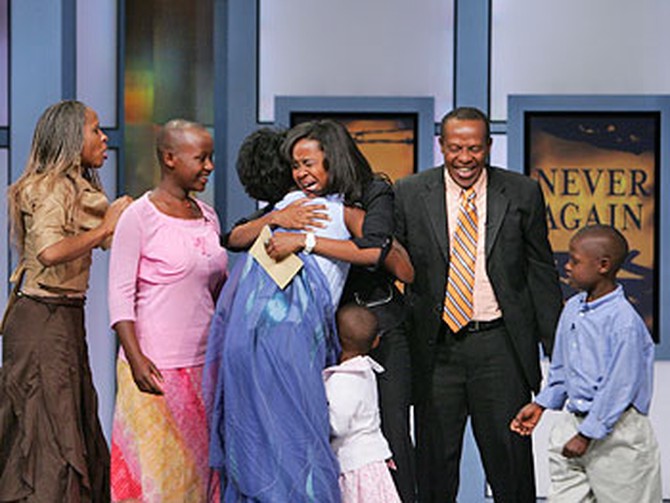
When Clemantine and Claire come up on stage to get the letter, they're in for a huge surprise! The Oprah Winfrey Show has flown their family to Chicago for a joyful and long overdue reunion!

High school students across the country shared how Night has helped them find strength in their own lives. Miles Campbell has been escaping into books since he was a little boy. Faced with homelessness and other hardships throughout his life, Miles and his mother now live in a hotel because of a recent eviction. "It wasn't my mom's fault," he says. "My mom works extremely hard, but she's a single parent. Most of my friends really don't know that I live in a hotel. I'm not embarrassed, but it's kind of tough. I don't want to be anybody's pity case."
Living in a hotel has distanced Miles from other students. It takes him almost two hours and two buses to get to school each day. Most kids in his situation might not make it to school, let alone into The National Scholars Honor Society.
Miles says it's his hardworking mother who inspires him. While she works late into the night waitressing triple shifts, Miles delves into books. One that has given him strength is Night.
"I've related to Night because I do feel like I'm a survivor," Miles says. "If [Elie Wiesel] can survive his hardship, I can survive mine. I would like Mr. Wiesel to know that his writing has made me want to be a better person."
Living in a hotel has distanced Miles from other students. It takes him almost two hours and two buses to get to school each day. Most kids in his situation might not make it to school, let alone into The National Scholars Honor Society.
Miles says it's his hardworking mother who inspires him. While she works late into the night waitressing triple shifts, Miles delves into books. One that has given him strength is Night.
"I've related to Night because I do feel like I'm a survivor," Miles says. "If [Elie Wiesel] can survive his hardship, I can survive mine. I would like Mr. Wiesel to know that his writing has made me want to be a better person."
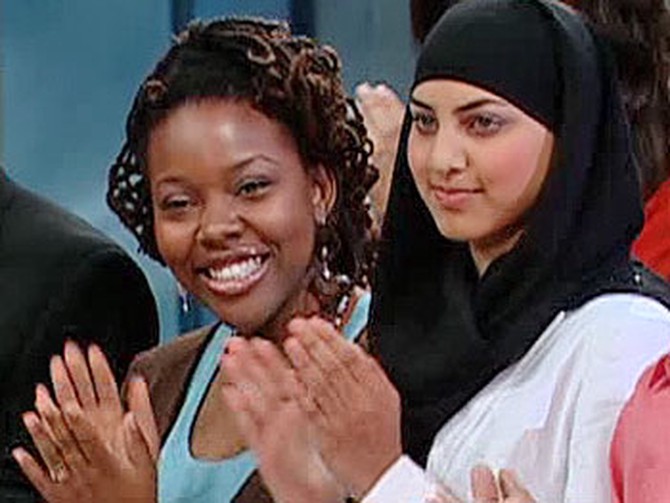
Essay contest sponsors AT&T have something more for the winners—the 50 students get a $5,000 scholarship to the college of their choice! And that's not all—Oprah is matching AT&T's gift, for a total of $10,000 for each student!
Meet all 50 winners and read the opening passages of their winning essays.
Meet all 50 winners and read the opening passages of their winning essays.
Published 05/25/2006

